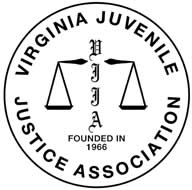|
|
 |
Founded in 1966, the Virginia Juvenile Justice Association is an organization
comprised
of professionals from court services, DJJ Administration,
indigent defense, the judiciary, secure detention, juvenile
correctional
facilities, halfway houses, group homes, private providers and
others with an interest in youth
and family services.
The organization is administered by an elected board of
directors and is committed to
child advocacy and advancing the professional
interests and competencies of its members.
WHAT WE BELIEVE
We believe in a juvenile justice system that
…
recognizes that
adolescents are not yet who they will become and are capable of change;
differentiates between criminal/delinquent acts and normative adolescent acting-out;
uses proven models, strategies
and approaches;
presumes innocence,
protects liberty and justice and affords due process of law;
ensures community protection and holds adjudicated children accountable for their actions;
weighs heavily decisions concerning
the deprivation of liberty and favors
the least restrictive means necessary to achieve public safety;
is free from racial, ethnic, and gender disparities and exercises objective
decision-making
as a means to ensure fairness and equity;
relies upon data to measure progress and guide policy, practice and programmatic changes;
promotes professionalism, collaboration, integrity, accountability
and
transparency among key stakeholder agencies;
provides services relative to risk level, arranged in a continuum, and
consistent with the principles
of effective intervention;
favors
fiscal responsibility and accountability to be good stewards of scarce resources;
does no greater harm, limits exposure to risk and exceeds minimum standards;
routinely reviews policies, practices,
and programs for quality, consistency with
stated goals, and the ever evolving science of our field.
WHAT WE BELIEVE
We believe in a juvenile justice system
that …
recognizes
that adolescents are not yet who they will become and are capable of change;
differentiates between criminal/delinquent acts and normative adolescent acting-out;
uses proven models, strategies
and approaches;
presumes innocence,
protects liberty and justice and affords due process of law;
ensures community protection and holds adjudicated children accountable for their actions;
weighs heavily decisions concerning
the deprivation of liberty and favors
the least restrictive means necessary to achieve public safety;
is free from racial, ethnic, and gender disparities and exercises objective
decision-making
as a means to ensure fairness and equity;
relies upon data to measure progress and guide policy, practice and programmatic changes;
promotes professionalism, collaboration, integrity, accountability
and
transparency among key stakeholder agencies;
provides services relative to risk level, arranged in a continuum, and
consistent with the principles
of effective intervention;
favors
fiscal responsibility and accountability to be good stewards of scarce resources;
does no greater harm, limits exposure to risk and exceeds minimum standards;
routinely reviews policies, practices,
and programs for quality, consistency with
stated goals, and the ever evolving science of our field.
WHAT WE DO
Awards & Recognition— Colleagues are recognized in a regular newsletter feature, “Colleagues
in the Spotlight,” and celebrated during “Probation, Parole and Community Supervision” week and “Detention,
Residential and Correctional” week. The association also recognizes members who have made extraordinary
contributions by awarding Meritorious Awards in the areas of Community Service, Court Services, Residential Services, and
Administration.
Professional Development—The Fall Juvenile Justice Institute is the organization’s
premier professional development event, attracting participants from throughout the Commonwealth and presenters from across
the nation. Single day training events are also held throughout the state.
Resources / Publications—Information
on proven models, promising approaches and effective strategies is disseminated through print and web-based forums and list-servs.
The Advocate, a professional newsletter, has been published since 1975.
Scholarships—Renamed
in memory of Robert E. Shepherd, Jr., the association awards professional development scholarships to obtain new credentials,
to attend specialized training, for academic courses, or to attend state and national conferences.
Advocacy—From
promoting proven practices to tracking legislation, our organization has a proud history of advocating for system-involved
children.
|
 |
|
|
|
|
|
 |

